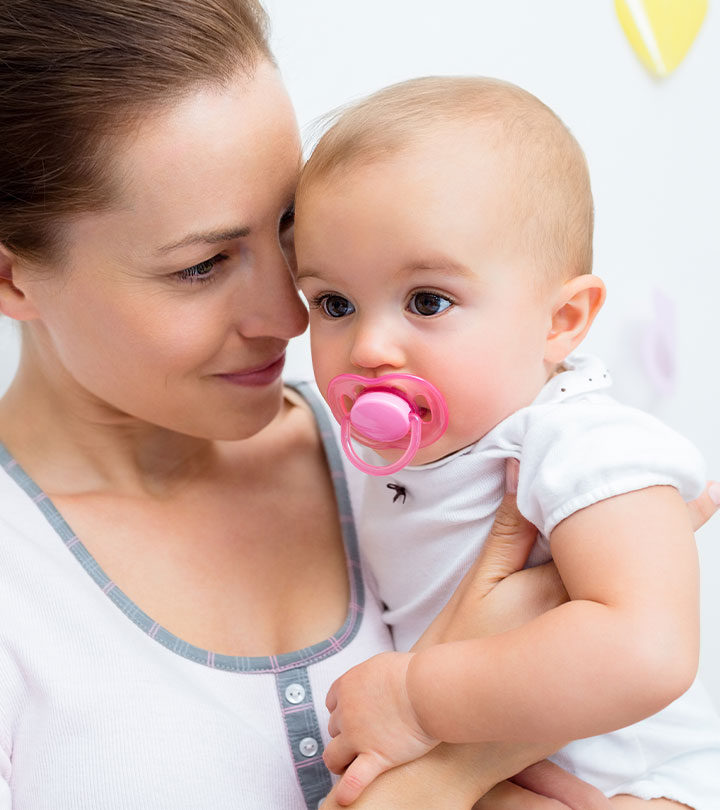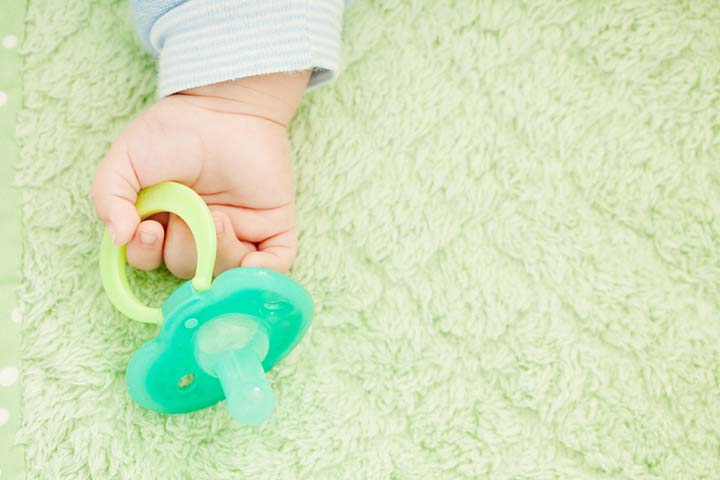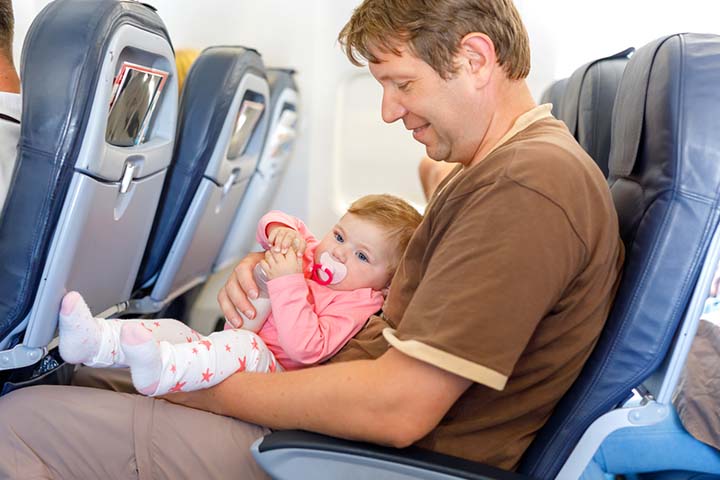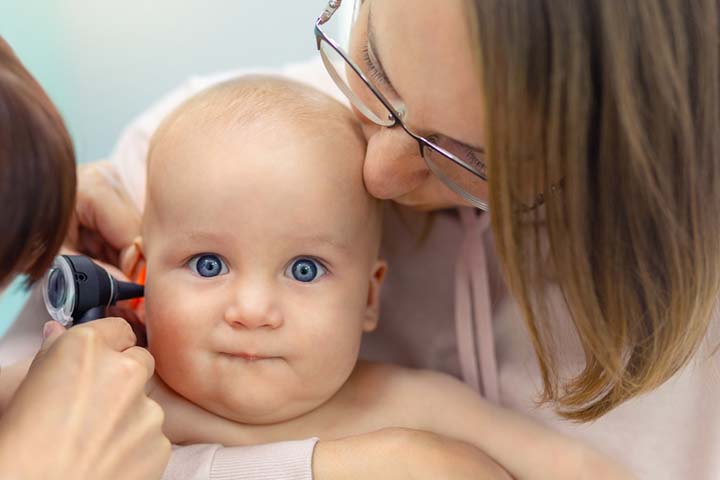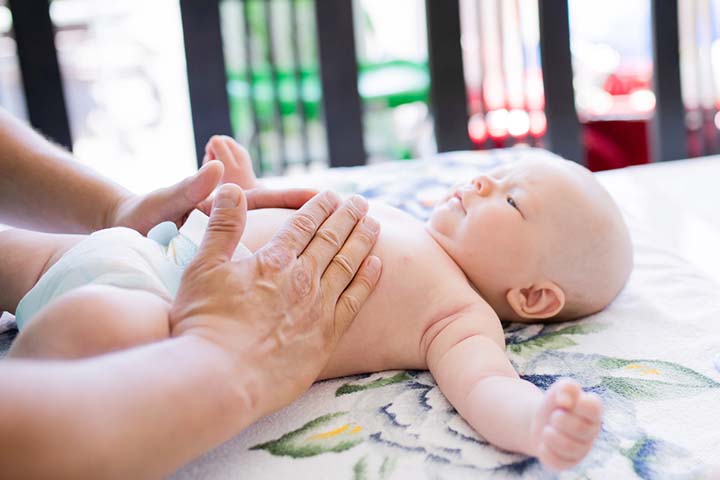Pacifiers are the most sought-after tools when it comes to calming babies down. Baby pacifiers are also known to reduce the risks of sudden infant death syndrome (SIDS). This is because these objects help newborns satisfy their natural sucking reflex and soothe them. But parents need to ensure that they introduce their baby to the pacifier at the right age and also wean them off it at the correct time. But is it right to let a baby suck on the pacifier for long periods? Read on to know more about the pros and cons of pacifiers and when you should stop giving them to your infant.
What Is A Baby Pacifier?
Pacifier, also called soother, dummy, or teether, is a small, nipple-shaped silicone or rubber accessory that is put in the baby’s mouth as a gum massager or to soothe him. It has several other informal names such as binky in American and nookie in Canadian English. Babies have a natural sucking reflex, which helps suckle from the breast (1). Since an orthodontic pacifier resembles a nipple, a baby can be calmed and made to feel secure, while also functioning as a teething toy. It is for this reason that babies take to pacifiers quickly.
Pacifiers are available in numerous designs. But, the American Academy of Pediatrics (AAP) recommends a one-piece pacifier, where the nipple, mouth guard, and handle are all carved out of a single piece of plastic (2).
You may take note of the below points while choosing a pacifier:
- Pacifiers come in different sizes for different age groups. Therefore, you need to select the right one based on your baby’s age. For example, a toddler-sized pacifier would be too big for an infant; and an infant-sized pacifier too small for a toddler.
- Single-piece pacifiers with a hole are the best as they allow circulation of air and prevent rashes around the mouth.
What Are The Pros And Cons Of Pacifiers?
Let’s first see the advantages of pacifiers before knowing their disadvantages.
Advantages of a pacifier:
- Reduces SIDS: Sudden infant death syndrome or SIDS is the unexpected death of a healthy baby. SIDS can happen anytime, especially during sleep, as the baby may suffocate due to excess bedding or when in an incorrect sleeping position.
According to the Centre for Disease Control and Prevention (CDC), in the US, there are approximately 3,400 cases of SIDS every year, with the majority of cases occurring in infants under the age of one. In 2020, there were about 1,389 SIDS-related deaths. Experts assert that the use of a pacifier reduces the chances of SIDS as it helps open airways wider and lets the infant breathe better (1). The AAP states that giving a pacifier to a baby before he falls asleep, significantly brings down the risk of SIDS (3).
- May help relieve colic: The sucking reflex brings a sense of security and soothes the baby. Parents can try pacifiers to control the repeated bouts of colic in a baby (4).
- Works as a distraction: There are times when the baby is just fussy, and no solution works. Pacifiers could relieve the fussiness by working as a distraction and relief (5).
- Pain relief:The pacifier is known to alleviate pain in babies undergoing invasive procedures such as lumbar puncture, catheter insertion, and even immunization. It is not known how a pacifier helps, but it is believed that the stimulation of sucking reflex relieves pain. For this reason, it is recommended that babies be given a pacifier before any invasive medical procedure is conducted.
- Helpful during air travel: Parents dread traveling by air with their baby as the abrupt changes in air pressure during flight makes the little one’s ears go pop. The eerie sensation makes babies uncomfortable eventually causing a crying outburst. A pacifier is helpful in keeping the infant’s mouth engaged with the sucking reflex, which normalizes the air pressure in the ear (6).
- Benefits the preterm infant: Premature babies have poor sucking reflex due to incomplete physical development. Research shows that non-nutritive sucking, using a pacifier, helps a preterm infant improve the sucking reflex, which is vital for breastfeeding (7). Exercising the sucking reflex has also been observed to support digestion in premature babies.
- Avoids early cessation of breastfeeding: A study has found that the pacifiers may help the mothers, who have a high risk for depression, to continue exclusive breastfeeding for a longer duration (8).
With the advantages done, let’s take a quick look at how pacifiers could be disadvantageous.
Disadvantages of pacifiers:
- Interference with breastfeeding: Introducing a pacifier early (within the first month) can lead to nipple confusion, where the infant is confused between the nipple of a breast and pacifier. If a newborn constantly uses pacifier he would not suckle the breast nipple properly. A study has found that babies who are introduced to a pacifier early are breastfed less frequently by their mothers (9). This interference is observed in full-term infants, and is different from preterm infants where pacifiers are used to exercise the sucking reflex.
- Impact on dental and oral health: Long-term pacifier usage can affect the baby’s dental health. Those who use pacifiers beyond the age of four years display adverse effects like misalignment of permanent teeth. Babies who use sugar or honey-dipped or flavored pacifiers are at a higher risk of dental caries and oral infections (10).
- Risk of ear infections: Contaminated and unclean pacifiers can transfer bacteria from the mouth to the middle ear, leading to an ear disease called otitis media. Studies have found a higher recurrence of ear infections in babies who use a pacifier (11).
Pacifiers have their share of detrimental effects, but the advantages outweigh the disadvantages.
Harmful effects are also subject to conditions:
| Ear infections | Happen due to poor hygiene |
| Dental problems | Occur when the baby uses a pacifier beyond the age of four years |
| Problems with breastfeeding | Happen when the baby is given a pacifier before he completes the first month |
The AAP states that there is limited evidence to blame pacifiers alone for troubled breastfeeding (12). The American Academy of Family Physicians (AAFP) also asserts that it is unclear if pacifiers are bad for infants (13).
In the absence of concrete evidence, we can say the benefits of a pacifier outweigh its drawbacks.
Should A Baby Be Given A Pacifier?
Yes, you can give the baby a pacifier, since you have now known that pacifiers have several proven benefits. Keep in mind the below points while introducing a pacifier.
- Age of the baby: The baby should be at least four weeks old (almost one month) before you introduce him to a pacifier. By four weeks, breastfeeding is established, and thus a pacifier will not interfere with the process.
- Does my baby need a pacifier?: If the baby uses a breast as a pacifier, then perhaps he needs more time with sucking reflex to soothe himself. Pacifiers make a good alternative for keeping the baby latched to the breast for soothing (1). If the baby won’t take a pacifier, then it is okay. Attempt again, but if there is a stiff resistance, then perhaps it is better to give a pacifier a pass.
Remember, it is finally your decision whether or not to give a pacifier to your baby. But in some cases it is a clear no.
When Should You Avoid A Pacifier?
Besides interfering with oral, dental, and ear health, there are other scenarios where it is better to not give your baby a pacifier.
- Baby has trouble suckling: If you are having trouble establishing breastfeeding even after the first month, then pacifiers are not a good choice. They interfere with breastfeeding and eventually lead to nipple confusion. Pacifiers are also not ideal for babies that are unable to gain weight due to breastfeeding problems.
- Babies with facial anomalies: Some babies with defects such as cleft lip may not take to pacifiers well. Doctors also recommend against the use of pacifiers for babies that have undergone any face or mouth correction surgeries (14).
Introducing pacifiers may be easy, but how about discontinuing them at the right time?
When To Discontinue Pacifier Use?
Babies give up pacifiers on their own between two and four years of age. Most break the habit through peer pressure, and also because they are old enough to soothe themselves without pacifiers. The American Dental Association (ADA) considers pacifiers less habit-forming than thumb-sucking (11). Therefore, a baby will be able to quit the use of a pacifier without any problems.
However, some infants are hard to be separated from their pacifiers. In such cases, you need to intervene.
Cammie Diane, a mother and blogger, reflects on how her daughter gave up her pacifier independently. She says, “She took the pacifier easily, and it was her close companion for the next twelve months. She still nursed a lot. I still hardly slept. But it made life survivable. She began to refuse to take it after her first birthday, which ended her pacifier use. There were no tantrums or problems getting her to let go. One day, she was done, and that was it (i).”
How To Make A Baby Give Up Pacifiers?
Here are some tips to make an infant stop using the pacifier (15) :
- Start reducing pacifier time: Cut down on the time the baby suckles a pacifier, or take it away from the baby for a fixed time in a day. If you face resistance, then distract the baby or involve him in an activity during that time frame. Gradually, cut down the time further, and soon you will notice that the infant becomes less dependent on pacifiers.
- Use other ways to soothe: If a baby uses a pacifier to fall asleep, then try alternative ways that could potentially soothe the infant to sleep. Try swaddling, warm bath, or gentle massage before bedtime to help the infant relax and sleep without the pacifier. Identify triggers when the baby tends to use the pacifier the most, like when upset, and replace the pacifier with other soothers.
- Make pacifiers distasteful: By 24 months, a baby can eat all vegetables (16). Try rubbing the nipple of the pacifier with some bitter gourd juice, or puree of any bitter vegetable, or vegetables that the baby dislikes. The idea here is to make the pacifier unappealing for the baby. Applying distasteful purees to the pacifier nipple is a neat trick when infants vehemently resist giving up the pacifier.
- Hide the pacifier, and tell a story: Infants older than 24 months love listening to tales. So, why not say that the tooth fairy took their pacifier away? Involve the entire family in the act, and the little one will be convinced that his pacifier is gone for good.
If the baby does not give up the pacifier until the age of four years, then you must take him to a doctor. Corrective measures through the use of counseling will help the little one give up pacifiers.
Now that you know all about pacifiers, we answer a few commonly asked questions.
Many parents find pacifiers for babies useful to keep their ward calm. Premature babies may find them especially useful since pacifiers help develop their sucking reflex. However, pacifiers come with certain cons as well, including the risk of ear infections if the pacifier is not cleaned well. You also need to know when to introduce a pacifier to your baby and when to stop giving it to them. In addition, pacifiers come in different sizes and designs and for different age groups, so ensure you purchase one that best suits your baby.
Key Pointers
- The American Academy of Pediatrics (AAP) recommends a one-piece pacifier for infants.
- Pacifiers can relieve colic, soothe the baby, alleviate pain, and help normalize air pressure during air travel.
- Pacifiers can also benefit premature infants by exercising their sucking reflex and aiding digestion.
- However, introducing a pacifier early (within the first month) can lead to nipple confusion and reduced breastfeeding frequency.
- Long-term use of pacifiers can also interfere with breastfeeding and impact an infant’s dental and oral health.
New parents may wonder if they should give their baby a pacifier to soothe them and keep them calm. Check out this interesting and informative video discussing the benefits and disadvantages of pacifiers to make an informed decision.
